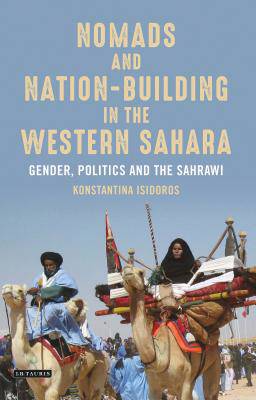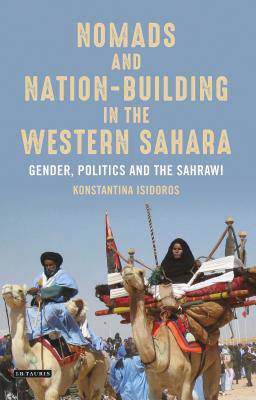
Je cadeautjes zeker op tijd in huis hebben voor de feestdagen? Kom langs in onze winkels en vind het perfecte geschenk!
- Afhalen na 1 uur in een winkel met voorraad
- Gratis thuislevering in België vanaf € 30
- Ruim aanbod met 7 miljoen producten
Je cadeautjes zeker op tijd in huis hebben voor de feestdagen? Kom langs in onze winkels en vind het perfecte geschenk!
- Afhalen na 1 uur in een winkel met voorraad
- Gratis thuislevering in België vanaf € 30
- Ruim aanbod met 7 miljoen producten
Zoeken
Nomads and Nation-Building in the Western Sahara
Gender, Politics and the Sahrawi
Konstantina Isidoros
€ 79,95
+ 159 punten
Uitvoering
Omschrijving
Fabled for more than three thousand years as fierce warrior-nomads and cameleers dominating the western Trans-Saharan caravan trade, today the Sahrawi are admired as soldier-statesmen and refugee-diplomats. This is a proud nomadic people uniquely championing human rights and international law for self-determination of their ancient heartlands: the western Sahara Desert in North Africa. Konstantina Isidoros provides a rich ethnographic portrait of this unique desert society's life in one of Earth's most extreme ecosystems. Her extensive anthropological research, conducted over nine years, illuminates an Arab-Berber Muslim society in which men wear full face veils and are matrifocused toward women, who are the property-holders of tent households forming powerful matrilocal coalitions. Isidoros offers new analytical insights on gender relations, strategic tribe-to-state symbiosis and the tactical formation of 'tent-cities'.
The book sheds light on the indigenous principles of social organisation - the centrality of women, male veiling and milk-kinship - bringing positive feminist perspectives on how the Sahrawi have innovatively reconfigured their tribal nomadic pastoral society into globalising citizen-nomads constructing their nascent nation-state. This is essential reading for those interested in anthropology, politics, war and nationalism, gender relations, postcolonialism, international development, humanitarian regimes, refugee studies and the experience of nomadic communities.
The book sheds light on the indigenous principles of social organisation - the centrality of women, male veiling and milk-kinship - bringing positive feminist perspectives on how the Sahrawi have innovatively reconfigured their tribal nomadic pastoral society into globalising citizen-nomads constructing their nascent nation-state. This is essential reading for those interested in anthropology, politics, war and nationalism, gender relations, postcolonialism, international development, humanitarian regimes, refugee studies and the experience of nomadic communities.
Specificaties
Betrokkenen
- Auteur(s):
- Uitgeverij:
Inhoud
- Aantal bladzijden:
- 304
- Taal:
- Engels
- Reeks:
Eigenschappen
- Productcode (EAN):
- 9781838604721
- Verschijningsdatum:
- 19/09/2019
- Uitvoering:
- Paperback
- Formaat:
- Trade paperback (VS)
- Afmetingen:
- 140 mm x 216 mm
- Gewicht:
- 353 g

Alleen bij Standaard Boekhandel
+ 159 punten op je klantenkaart van Standaard Boekhandel
Beoordelingen
We publiceren alleen reviews die voldoen aan de voorwaarden voor reviews. Bekijk onze voorwaarden voor reviews.









